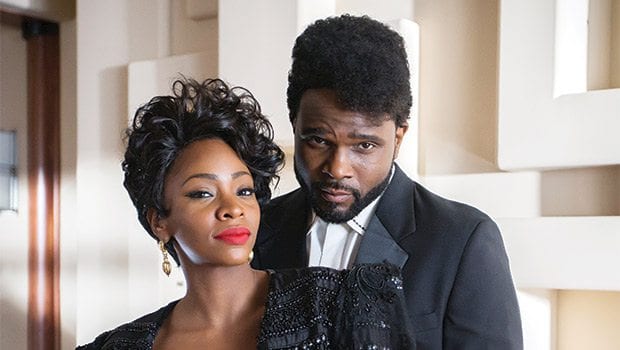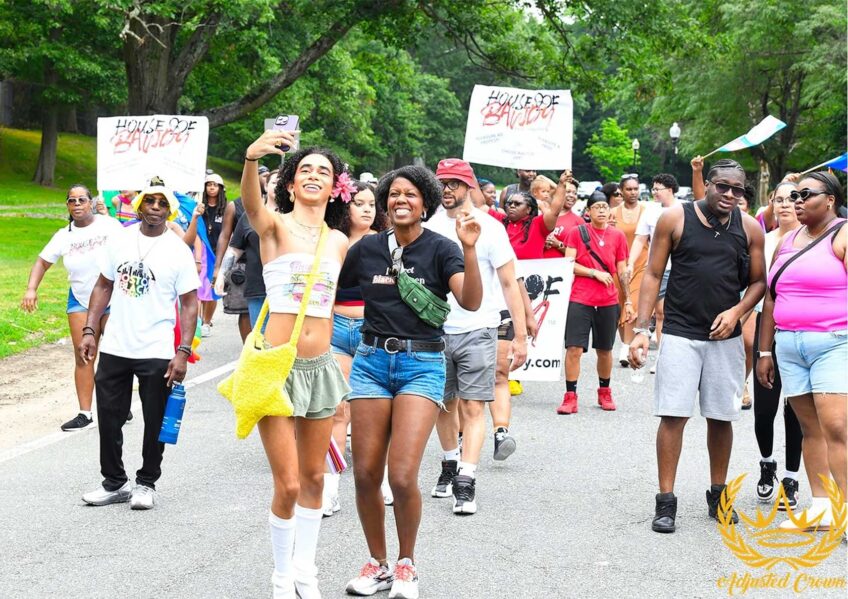
“I think it’s important for reflections of African American women in particular — and that’s what I am, so that’s what I play, those types of roles — to have images and reflections that are nuanced and textured,” said actor Teyonah Parris on tackling complex and multi-dimensional characters such as Dawn Chambers in the AMC series “Mad Men” and Colandrea “Coco” Conners in the film “Dear White People.”
Parris is set to take on another challenging role in TV One’s first ever bio-pic “Love Under New Management: The Miki Howard Story” about the life of Grammy Award-nominated singer Miki Howard airing this Sunday, June 12 at 7 p.m. ET. The film also stars Darius McCrary (HBO’s “The Leftovers,” “Family Matters”) as Gerald Levert and Vanessa Bell Calloway (Showtime’s “Shameless”) as Miki’s mother Josephine Howard.
The actress who starred in Spike Lee’s film “Chi-Raq” last October and is set to return as Missy Vaughn in the Starz series “Survivor’s Remorse” in July, spoke to the Banner about prepping for the title role as Howard, filming “Chi-Raq” in Chicago, and what #BlackGirlMagic means to her.
What attracted you to “The Miki Howard Story”?
Teyonah Parris: It’s such a dynamic and explosive and dramatic story that Miki has, and just all the ups and downs she goes through, and the opportunity to try to bore that journey, really attracted me to the role.
Has Miki Howard seen the movie and was she a part of the project in any way?
TP: She was part of it every step of the way. It’s her story and we’re lucky that she’s still alive and able to share in this moment, watch everything she’s gone through, be told, and share it with the world. To get her opinion is very important in this process because it’s her story.
How do you go about preparing for a role of a person who’s alive and present, not a historical figure, and who’s involved in the project?
TP: I was a little nervous. It’s like okay, I’m going to play this woman who’s still alive and I have to do it well, and the whole process was just really fast. It wasn’t like I got to spend months with her or know her. My goal was to meet her, talk to her, try to glean everything I can that she was willing to share with me. Look at the internet; take it to her, ‘Is this real? Is this not?’ that sort of thing. Really just research her, which can be really odd. You’re asking someone to just give you so much information, and not just the information about their life, but how they felt at that moment.
A lot of her story is drug abuse. It’s physical abuse. It’s mental abuse. It’s not something that you want someone to revisit all the time. Miki was totally okay with it. A lot of my reservations were self-imposed. She was willing to give the information freely. It was odd to me because it was like ‘how can you talk about this so freely now?’ but it’s just a part of her past and there’s just a different view of it, and also remembering that how she felt today is not necessarily how she experienced it 20 years ago. It was a fun process. I wanted to make sure I captured her essence because we didn’t have the time to spend months and months together. It was important for me to capture her essence and for her to be happy with what we were doing.
For the role of Lysistrata in “Chi-Raq” did you have to go through an audition process? Did Spike Lee call you?
TP: Spike said he saw me in “Dear White People” and that’s when he wanted to use me in “Chi-Raq.” We ended up having a meeting. I didn’t technically audition, I guess. I put myself on tape. Well, he put me on tape to show the network but that was weeks after we had already discussed the part. It was a matter of talking to him and him getting to know who I was. He didn’t even tell me anything about this movie. What he ended up doing was sending me the script one night and saying ‘okay, you’re going to read this tomorrow. Come prepared.’ It’s like, ‘oh, okay.’ I know now that it was a read for Amazon so they could hear it out loud and it just went from there.
How was it filming in Chicago during that time?
TP: It was wonderful. The community really embraced us being there. They were really happy that someone, like Spike, was telling their story. The city is beautiful. We shot in Englewood but we were all over Chicago. It was my first time spending an excess amount of time there so that was fun. But just to be really in the community and have their support definitely made it better.
I read the interview that you did with Essence [magazine] earlier this year. I loved the cover. What does #BlackGirlMagic mean to you?
TP: “Black girl magic” to me is when a young woman of color, black girls, you just see their confidence, and a sense of self. It’s that thing in a young woman that you can’t touch. You can’t really put a word to it. You don’t really understand what it is. You see a shining. You see a glow and a spirit; that it has to be “black girl magic.”






